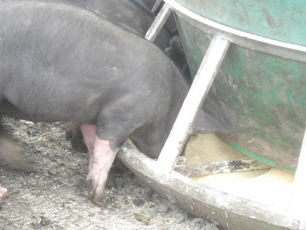G2156
Good Management Practices for Youth
Feed and Nutrition
As a good and responsible livestock producer, you are providing excellent care for your animals on a full-time basis. Below are sound production practices to help your animal thrive in your care. In addition, a checklist has been provided to make sure you follow these guidelines prior to and while at fairs and other public exhibitions.
This is No. 1 in a series of seven documents on good management practices for youth. Copies of these documents, commonly asked questions, feed and water requirements, and many other animal care and well-being documents can be accessed at http://4h.unl.edu/resourceanimalcare.
Lindsay M. Chichester, Extension Educator
Dennis E. Bauer, Extension Educator
|
Prior to Fair
Animals have some basic needs, including food, water, and shelter.
To grow and function normally, your animal must have access to fresh, clean water daily.
Your animal also needs feed, which provides the nutrients for its development and growth. A feeding schedule works best. For example, if you feed at 7 a.m. and 6 p.m. daily, try to follow that routine as closely as possible. Changing the feeding time could potentially cause digestive problems for your animal.
During the hot summer months, you should feed your animal early in the morning and/or later in the evening when the outdoor temperature is lower. Cooler temperatures will increase your animal’s appetite and encourage it to eat.
You should regularly clean out the water tank, water trough, or bucket that your animal may be drinking from daily. A water tank that is dirty or covered with algae could cause health problems for your animal.
You should store your feeds (especially grain) in an area that rodents cannot get into. This will keep your feed in top quality condition and help keep away rodents that could spread disease.
Prior to fair, it is important to try to re-create the situations your animal may experience at the fair. For example, your animal may be eating or drinking out of a tub or bucket at the fair rather than the containers used at home.
At fair your animal may be housed in a stall or small pen, while at home it may have a larger, more open space. By introducing these things to your animal prior to the fair, your animal will be more familiar with the new environment. This will cause less stress for both you and your animal.
As a good youth producer, I know that prior to fair my animal has received:
- fresh, clean water daily,
- good quality, clean feed daily,
- feed and water at regular times daily, and
- training on the environmental stressors it may experience at the fair.
While at Fair
During the fair, it is important to continue a regular feeding schedule for your animal. In addition, you should try to make your animal as comfortable as possible in the new surroundings. For the health and security of your animal, do not loan or use feeder or watering containers from other exhibitors.
As a good youth producer, I know that at fair my animal has received:
- fresh, clean water daily,
- good quality, clean feed daily, and
- feed and water at regular times daily.
By following these guidelines prior to and during fairs and exhibitions, you can minimize stress for both you and your animal. In return, your animal not only will perform better but also will behave better. You will have the satisfaction of knowing that you have provided the best possible care for your animal.
Annually, Nebraska’s youth are required to complete Quality Assurance (QA) training. Quality Assurance is a program that educates youth about the best management practices for livestock production. In addition, it was developed to assure consumers that the food products produced from animals are wholesome and safe, and that the animals that produced the product were cared for properly. In 2012, this training also was made available online for 4-H and FFA members at three different age levels: Junior (8-10); Intermediate (11-14); and Senior (15-18). More information about the Nebraska Youth QA Program can be found at http://4h.unl.edu/qualityassurance.
This publication has been peer reviewed.
Visit the University of Nebraska–Lincoln Extension Publications website for more publications.
Index: Animals, General
Management
Issued June 2012
